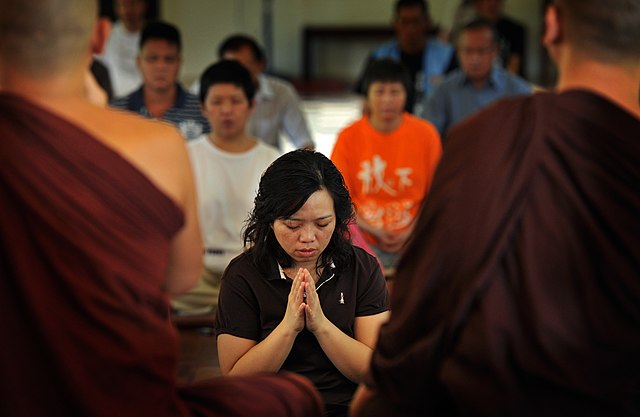The five precepts or five rules of training is the most important system of morality for Buddhist lay people. They constitute the basic code of ethics to be respected by lay followers of Buddhism. The precepts are commitments to abstain from killing living beings, stealing, sexual misconduct, lying and intoxication. Within the Buddhist doctrine, they are meant to develop mind and character to make progress on the path to enlightenment. They are sometimes referred to as the Śrāvakayāna precepts in the Mahāyāna tradition, contrasting them with the bodhisattva precepts. The five precepts form the basis of several parts of Buddhist doctrine, both lay and monastic. With regard to their fundamental role in Buddhist ethics, they have been compared with the ten commandments in Abrahamic religions or the ethical codes of Confucianism. The precepts have been connected with utilitarianist, deontological and virtue approaches to ethics, though by 2017, such categorization by western terminology had mostly been abandoned by scholars. The precepts have been compared with human rights because of their universal nature, and some scholars argue they can complement the concept of human rights.

Plaque with the five precepts engraved in English, Lumbini, Nepal
In Thailand, a leading lay person will normally request the monk to administer the precepts.
The format of the ceremony for taking the precepts occurs several times in the Chinese Buddhist Canon. Plaque used at a zen center.
Living a life in violation of the precepts is believed to lead to rebirth in a hell.
Upāsaka (masculine) or Upāsikā (feminine) are from the Sanskrit and Pāli words for "attendant". This is the title of followers of Buddhism who are not monks, nuns, or novice monastics in a Buddhist order, and who undertake certain vows. In modern times they have a connotation of dedicated piety that is best suggested by terms such as "lay devotee" or "devout lay follower".
The word Upāsaka (Brahmi script), used by Ashoka in his Minor Rock Edict No.1 to describe his affiliation to Buddhism (circa 258 BCE).





